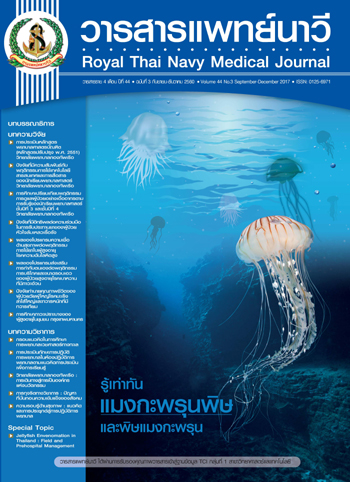Factors Influencing Medication Adherence in Patients with Chronic Heart Failureรัง
Main Article Content
Abstract
This study was conducted to determine the predictive correlations by studying
the medication adherence in patients with chronic heart failure and also focused on the
influence of the severity of disease, financial status, barriers to medication adherence and
patient-provider relationships in co-predicting medication adherence in patients with chronic
heart failure. The sample was composed of 120 patients with chronic heart failure who were
treated at the Outpatient department of a tertiary hospital. Data were collected using questionnaires
namely, the personal data, the severity of disease evaluation assessment form, the
barriers to medication adherence assessment form, the trust in provider assessment form
and the medication adherence assessment form. All data were analyzed using descriptive
statistics and logistic regression analysis.
According to the results, the samples were males (66.7%) with a mean age of
54.28 years (SD = 11.27), medication adherence at 47.5%. Severity of disease, financial status,
barriers to medication adherence and patient-provider relationships were co-predicted the
medication adherence in patients at 17.8% (Nagelkerke R2 = 0.178). Financial status and
patient-provider relationships were also co-predicted the medication adherence with a statistical
significance of OR = 1.76 (p < .05), and OR = 1.06 (p < .05), respectively.
Based on the findings, the researcher recommends the development of programs
to promote patient-provider relationships based on a foundation of trust to promote medication
adherence in patients, assess their financial status and plan to help those with problems to
reduce medication nonadherence.
Article Details

This work is licensed under a Creative Commons Attribution-NonCommercial-NoDerivatives 4.0 International License.
References
Mozaffarian D, Benjamin EJ, Go AS, Arnett DK, Blaha MJ, Cushman M, et al. Heart Disease and Stroke Statistics—2015 Update A Report From the American Heart Association. Circulation 2015;131(4):e29-e322.
สำนักนโยบายและยุทธศาสตร์ กระทรวงสาธารณสุข. สรุปรายงานการป่วย 2557. [อินเทอร์เน็ต]. [เข้าถึงเมื่อ 10 กันยายน 2559]. แหล่งที่มา: https://bps.moph.go.th/new_bps/.
งานเวชระเบียน โรงพยาบาลศิริราช. สถิติผู้ป่วยนอกผู้ป่วยหัวใจล้มเหลว ปี พ.ศ. 2558. กรุงเทพมหานคร: โรงพยาบาลศิริราช; 2558.
McMurray JJV, Adamopoulos S, Anker SD, Auricchio A, Böhm M, Dickstein K, et al. ESC Guidelines for the diagnosis and treatment of acute and chronic heart failure 2012. Eur Heart J 2012;33(14):1787-847.
American Heart Association. Heart Failure. [Internet]. [cited 2015 May 10]. Available from: https://www.heart.org/HEARTORG/Conditions/HeartFailure/HeartFailure_UCM_002019_ SubHomePage.jsp.
Horne R, Weinman J, Barber N, Elliott R, Morgan M, Cribb A, et al. Concordance, adherence and compliance in medicine taking. London: NCCSDO; 2005. p. 40-6.
Riegel B, Lee CS, Ratcliffe SJ, De Geest S, Potashnik S, Patey M, et al. Predictors of objectively measured medication nonadherence in adults with heart failure. Circ Heart Fail 2012;5(4):430-6.
Fitzgerald AA, Powers JD, Ho PM, Maddox TM, Peterson PN, Allen LA, et al. Impact of medication nonadherence on hospitalizations and mortality in heart failure. J Card Fail 2011;17(8):664-9.
World Health Organization. Adherence to Long –Term Therapies Evidence for action. Switzerland: World Health Organization; 2003.
Kamran A, Sadeghieh Ahari S, Biria M, Malepour A, Heydari H. Determinants of Patient’s Adherence to Hypertension Medications: Application of Health Belief Model Among Rural Patients. Ann Med Health Sci Res 2014;4(6):922-7.
Wu JR, Moser DK, Chung ML, Lennie TA. Predictors of medication adherence using a multidimensional adherence model in patients with heart failure. J Card Fail 2008;14(7):603-14.
Rapin Polsook. Factor influencing medication adherence among persons with post-acute myocardial infarction. [Doctoral Dissertation]. Chulalongkorn University; 2012.
Murray B, Mecrone S. An Integrative review of promoting trust in the patient - primary care provider relationship. J Adv Nurs 2015;71(1):3-23.
Thom DH, Hall MA, Pawlson LG. Measuring patients’ trust in physicians when assessing quality of care. Health Aff (Millwood) 2004;23(4):124-32.
กัลยา วานิชย์บัญชา. การวิเคราะห์ข้อมูลหลายตัวแปร. พิมพ์ครั้งที่ 4. กรุงเทพมหานคร: ธรรมสาร; 2552.
Müller S, Kohlmann T, Wilke T. Validation of the Adherence Barriers Questionnaire - an instrument for identifying potential risk factors associated with medication-related non-adherence. BMC Health Serv Res 2015;15:153.
Muir KW, Santiago-Turla C, Stinnett SS, Herndon LW, Allingham RR, Challa P, et al. Glaucoma Patients’ Trust in the Physician. J Ophthalmol 2009;2009; Article ID 476726:1-5.
Horne R, Weinman J. Patients’ beliefs about prescribed medicines and their role in adherence to treatment in chronic physical illness. Journal of Psychosomatic Research 1999;47(6):555-67.
Napaporn Rujisatian. The relationship of illness representations and beliefs about medication to adherence to oral hypoglycemic medication in persons with type 2 diabetes. [Master Thesis]. Mahidol University; 2009.
Brodaty H, Pond D, Kemp NM, Luscombe G, Harding L, Berman K, et al. The GPCOG: a new screening test for dementia designed for general practice. J Am Geriatr Soc 2002;50(3):530-4.
จิรนันท์ กริฟฟิทส์. รายงานการวิจัยเรื่องแบบประเมินความรู้ความเข้าใจจีพีค็อก (ฉบับภาษาไทย): ความเที่ยงตรงและความเชื่อมั่น. เชียงใหม่: ภาควิชากิจกรรมบำบัด คณะเทคนิคการแพทย์ มหาวิทยาลัยเชียงใหม่; 2556.
Nair KV, Belletti DA, Doyle JJ, Allen RR, McQueen RB, Saseen JJ, et al. Understanding barriers to medication adherence in the hypertensive population by evaluating responses to a telephone survey. Patient Prefer Adherence 2011;5:195-206.
Morgan AL, Masoudi FA, Havranek EP, Jones PG, Peterson PN, Krumholz HM. Difficulty Taking Medications, Depression, and Health Status in Heart Failure Patients. J Card Fail 2006;12(1):54-60.
Campbell DJ, King-Shier K, Hemmelgarn BR, Sanmartin C, Ronksley PE, Weaver RG, et al. Self-reported Financial Barriers to Care Among Patients with Cardiovascular related Chronic Conditions. Health Rep 2014;25(5):3-12.
Kalousova L, Burgard SA. Tough choices in tough times: debt and medication nonadherence. Health Educ Behav 2014;41(2):155-63.


